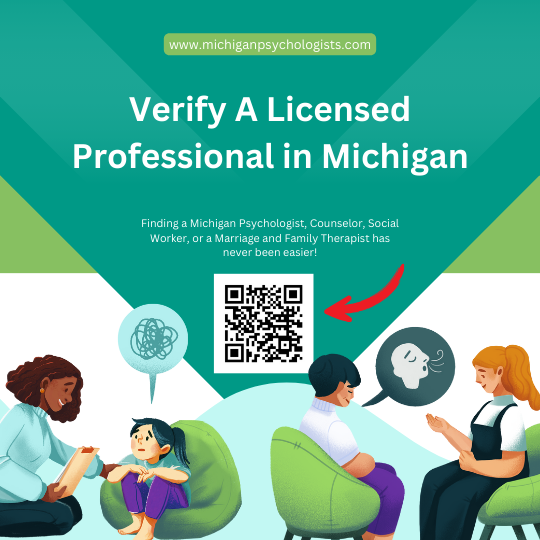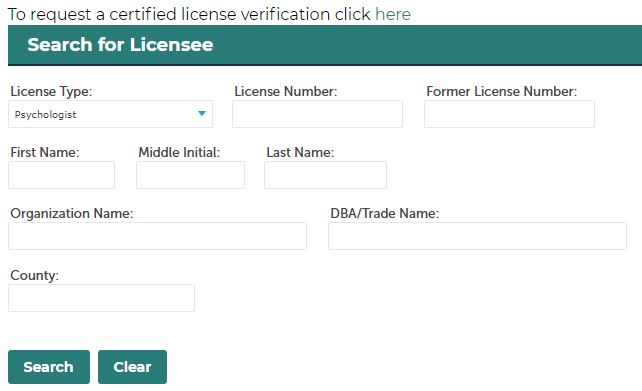Verify A Licensed Professional In Michigan
Home » Verify A Licensed Professional In Michigan

Table of Contents
Navigating the Michigan LARA license search tool can be challenging. The tool presents a lengthy list of professionals, and the various mental health licensing types in Michigan can make it overwhelming. But don’t worry, this easy-to-follow guide will simplify the process for you. Before you start searching, make sure you have a few key pieces of information: your clinician’s credentials, name, and, if available, their license number. This will help you get the best search results and ensure you’re verifying the right professional.
Step By Step Guide To Verify A Mental Health Professional In Michigan
- Access the LARA Professional License Search Tool
- Once there, select “Health Professionals”
- Select “Psychology” to access the advanced search tool
- Select the Mental Health License Type and enter their first and last name. If they have an active license, their current information should populate.

- If the credentials are LP select “Psychologist” for license type.
- If DLLP, select “Doctoral Educational Limited”.
- If LLP, select “Masters Limited Psychologist”.
- If TLLP, select “Masters Limited Psychologist – Temporary Educational Limited”.
- If LMSW, select “Masters Social Worker”
- If LLMSW, select “Masters Social Worker Limited”
- If LPC, select “Licensed Professional Counselor”
- If LLPC, select “Limited Licensed Counselor”
- If LMFT, select “Marriage and Family Therapist”
- If LLMFT, select “Marriage and Family Therapist Educational Limited”
The Importance of Verifying a Mental Health Professional’s License
When seeking mental health services, verifying the credentials of a mental health professional is a crucial step. Ensuring that a psychologist or therapist is licensed is fundamental for several reasons, each contributing to the safety, efficacy, and ethical standards of the care provided.
1. Ensures Professional Competence
Licensing requirements are designed to ensure that mental health professionals possess the necessary education, training, and skills to provide competent care. These requirements typically include:
- Educational Qualifications: A licensed professional has completed a rigorous educational program, often culminating in a doctoral degree for psychologists or a master’s degree for therapists.
- Supervised Experience: Licensure requires supervised clinical experience, ensuring that the professional has hands-on experience under the guidance of an experienced mentor.
- Examinations: Professionals must pass standardized examinations (such as the EPPP for psychologists) that test their knowledge and readiness to practice independently.
2. Maintains Ethical Standards
Licensed mental health professionals are bound by a code of ethics, such as those established by the American Psychological Association (APA) or the National Association of Social Workers (NASW). These ethical guidelines cover:
- Confidentiality: Ensuring that client information is kept private and secure.
- Informed Consent: Making sure that clients are fully aware of the nature of the treatment, its risks, and benefits.
- Professional Boundaries: Preventing conflicts of interest and maintaining appropriate professional relationships.
3. Provides Accountability
Licensing boards oversee the conduct of mental health professionals. If a licensed professional violates ethical or professional standards, they can face disciplinary actions, including:
- Sanctions: Penalties for unethical or unprofessional behavior.
- Suspension or Revocation: The professional’s license can be suspended or revoked, preventing them from practicing.
- Public Records: Disciplinary actions are often recorded and made available to the public, providing transparency.
4. Protects Clients from Fraud and Abuse
Verifying a professional’s license helps protect clients from unqualified individuals who may falsely claim to be licensed. Unlicensed practitioners may lack the necessary training and could potentially cause harm through:
- Ineffective Treatment: Lack of proper training can lead to ineffective or even harmful interventions.
- Financial Exploitation: Clients might be overcharged for substandard services.
- Emotional Harm: Unethical practices can exacerbate a client’s mental health issues rather than ameliorate them.
5. Ensures Up-to-Date Knowledge and Skills
Licensed professionals are required to engage in continuing education to maintain their licenses. This ongoing education ensures that they remain knowledgeable about the latest research, techniques, and ethical standards. This is crucial in a field where:
- New Treatments Emerge: Staying current with the latest therapeutic modalities can significantly impact treatment outcomes.
- Evolving Ethical Standards: Keeping up with changes in ethical guidelines ensures that professionals continue to provide the highest standard of care.
6. Facilitates Legal Recourse
In the unfortunate event that something goes wrong, clients have legal recourse against licensed professionals. Licensing boards can investigate complaints, and clients can seek justice through legal means if necessary. This provides a layer of protection and assurance that:
- Complaints Will Be Addressed: Clients can file complaints with the licensing board, which is obligated to investigate.
- Legal Standards: Licensed professionals are aware that they must adhere to legal and professional standards, or face consequences.
Verifying a mental health professional’s license is a vital step in ensuring safe, effective, and ethical care. It protects clients from harm, ensures that they receive treatment from qualified and competent professionals, and upholds the integrity of the mental health profession. As a client, taking this step empowers you to make informed decisions about your mental health care, fostering a therapeutic environment built on trust and professionalism.